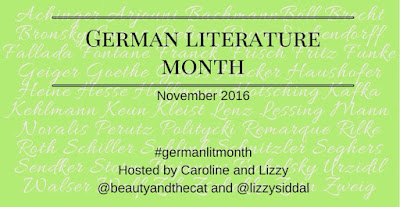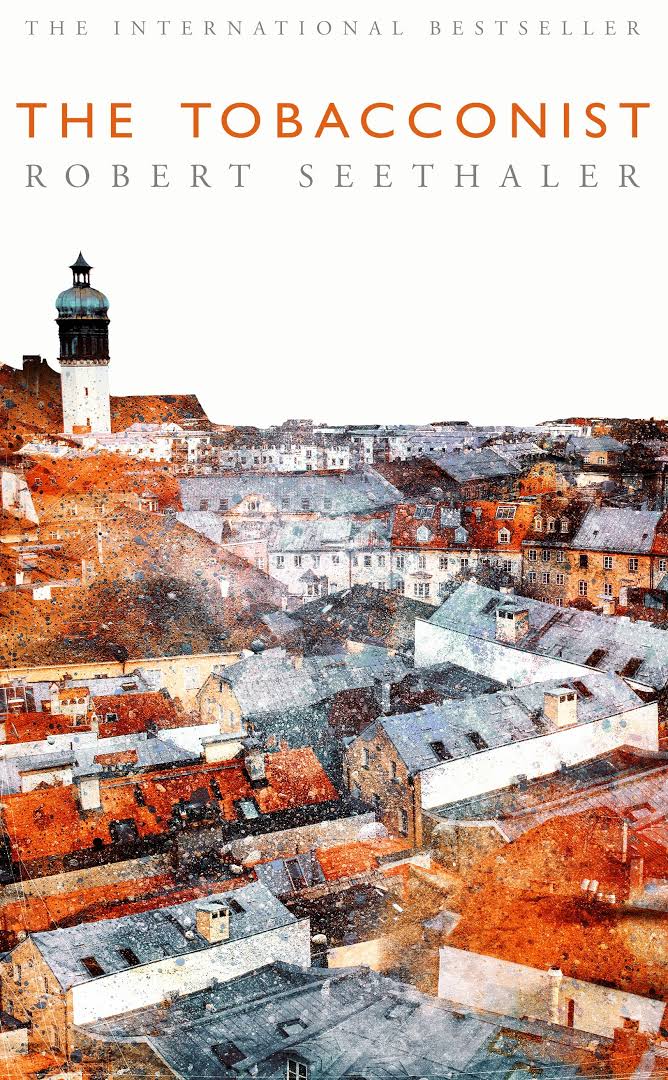
The Tobacconist (Der Trafikant) is after A Whole Life (Ein ganzes Leben) the second novel by Robert Seethaler that was published in English translation. I read it in the original German, therefore my review cannot do justice to the English translation.
The year is 1937. Franz Huchel, the main character of the book, is a 17-year-old from the Austrian countryside, who grows up as a single child of a single mother. At the beginning of the book, Franz is very much a protected child, a namby-pamby, but after the unexpected death of his mother’s wealthy lover, the days of dreaming are over: he is sent to Vienna for work. His employer, Otto Trsnjek, is also a former lover of his mother from pre-WWI days, and is running a trafik, a shop where people can buy tobacco, newspapers, stationery. Otto Trsnjek lost a leg in the war and with his shop he is a well-known presence in the neighborhood; he is teaching Franz how to properly read and understand the newspapers, but also the psychology of the different customers of the shop, and the characteristics of the different varieties of cigars they are selling (although none of the two is a smoker); and a few lessons about life in general. Otto’s tobacco shop becomes the new home of Franz, and it is from there where he learns to adapt to the big city.
With his mother Franz stays in touch via the picture postcards they are writing each other; it is from these postcards his mother learns about the major changes in Franz’ life: Franz falls in love with Anezka, a girl from Bohemia, and he gets acquainted with an old gentleman who is a regular customer of the tobacco shop: Sigmund Freud who is living nearby in the Berggasse, is buying cigars from Otto Trsnjek.
While the buxom Anezka with the charming tooth gap is awakening Franz’ sexuality and lust, the professor, who is taken in by the persistence with which the simple country boy is asking him for advice regarding his sorrows related to love and lust, is reassuring Franz. The frailness of the old professor, his fight with old age and the illness from which he is suffering since many years – the permanent pain and the problems with his jaw prosthesis are a recurring theme -, but also his frankness about how little he actually knows about the human psyche, impress Franz very much and the moment when the professor teaches him how to enjoy the smoking of a cigar on a park bench belong for sure to Franz’ most happy moments.
What would be in other times a normal coming-of-age story gets a twist because of the political events that are taking place in Austria at the time the story of Franz unwinds: 1938 is the year of the “Anschluss”, Austria is uniting with Nazi Germany, a development that is changing things forever in the lives of many people. Professor Freud is emigrating in the last moment (thanks to the organizational skills of his daughter Anna), socialists and other leftists are arrested or forced into suicide, and the tobacco shop is vandalized, and finally Otto Trsnjek is arrested by the Gestapo, a development that is seen by some neighbors with obvious glee, particularly by the rather disgusting butcher from next door, a sadistic figure as if from a play by Ödön von Horvath.
And Franz? He is still in doubt about Anezka, who appears and disappears without note on various occasions, and who displays her naked body in a “Varieté” (a kind of music hall), finally starting a relationship with a young SS officer for whom she is deserting Franz. When Franz is arrested in the tobacco shop which he is running after Otto’s death in the hands of the Gestapo, he locks the doors of the trafik because “you never know”. But when Anezka passes by the shop in March 1945, briefly before a major bombing raid, all that is left from the previous tobacco shop are some chairs and a note on which Franz had noted a dream he had, a habit he developed after Freud convinced him of the usefulness of this practice. Obviously, Franz never came back after his arrest, and it is easy to guess why.
Did I like the book? Yes, very much! There are a number of reasons for this. Seethaler writes a beautiful, elegant, effortless prose, and I hope that also the English translation will give a good idea of his stylistic abilities. As a professional actor (you can see him here in the movie Youth), Seethaler has obviously a good ear for dialogues and for the individual way of expression of each of his characters. He succeeds with very simple means to give the reader a clear indication about how each of the major figures in the book is speaking. Anezka for example comes from Bohemia, a region whose people were famous for their problems with the German umlauts, and a very few examples are already enough to have her voice practically in your ear. Another beautiful element are the postcards between Franz and his mother which in the beginning are full of platitudes but which develop into a real correspondence parallel to the process of Franz’ intellectual and sensual awakening. The atmosphere of the growing paranoia after the Anschluss, the outbursts of personal violence and sadism on a large scale of otherwise “normal” citizens that was without precedence even in Nazi Germany; the seemingly im-probable and “impossible” friendship between the simple Franz and the sophisticated Professor Freud; and the fine characterization of the inhabitants of Vienna – all this made me enjoy the book.
Franz is a hero in the typical German tradition of the simple, good-hearted, noble fool (“reiner Tor”); but contrary to Eichendorff’s Good-for-Nothing, The Tobacconist has no ending in which “everything, everything was delightful” – the exact opposite is true in this case. A Happy End is not possible in the time of Nazism.
It was particularly interesting for me to read this book for this year’s German Literature Month after I reviewed last year The Tortoises by Veza Canetti, a work that covers the same period in Vienna. Considering the recent very strong support of right-wing extremists by the voters of those political forces in Austria who represent the ugly side of the Austrian national character in the latest elections in the country, the book had also sometimes a chilling effect on me. The mentality that showed its ugly face after the Anschluss in 1938 is still existing and very widespread in Austrian society; however, the wave of successful political movements which are based on hatred of certain groups within a society is unfortunately not limited to Austria alone these days.


Robert Seethaler: Der Trafikant, Kein & Aber, Zürich 2012; The Tobacconist, Picador 2016, translated by Charlotte Collins
#germanlitmonth
(This review is part of the German Literature Month, again hosted by my two blogger colleagues Caroline@beautyandthecat, and Lizzy@lizzysiddal, who are doing a great job promoting German literature in translation since years.)
© Thomas Hübner and mytwostotinki.com, 2014-6. Unauthorized use and/or duplication of this material without expressed and written permission from this blog’s author and/or owner is strictly prohibited. Excerpts and links may be used, provided that full and clear credit is given to Thomas Hübner and mytwostotinki.com with appropriate and specific direction to the original content.






 Facebook
Facebook RSS
RSS Twitter
Twitter